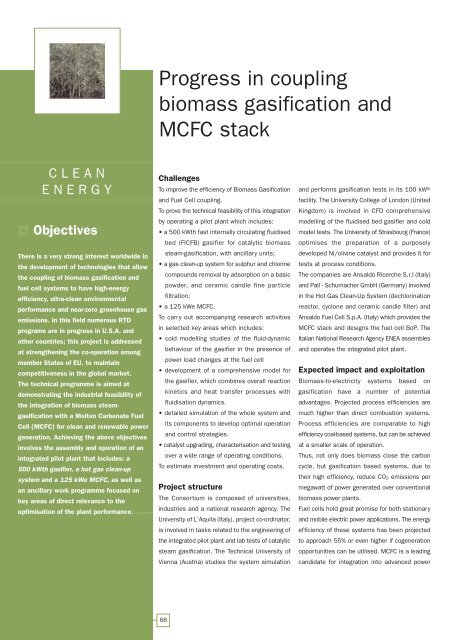European Bio-Energy Projects
European Bio-Energy Projects
European Bio-Energy Projects
You also want an ePaper? Increase the reach of your titles
YUMPU automatically turns print PDFs into web optimized ePapers that Google loves.
CLEAN<br />
ENERGY<br />
Objectives<br />
There is a very strong interest worldwide in<br />
the development of technologies that allow<br />
the coupling of biomass gasification and<br />
fuel cell systems to have high-energy<br />
efficiency, ultra-clean environmental<br />
performance and near-zero greenhouse gas<br />
emissions. In this field numerous RTD<br />
programs are in progress in U.S.A. and<br />
other countries; this project is addressed<br />
at strengthening the co-operation among<br />
member States of EU, to maintain<br />
competitiveness in the global market.<br />
The technical programme is aimed at<br />
demonstrating the industrial feasibility of<br />
the integration of biomass steamgasification<br />
with a Molten Carbonate Fuel<br />
Cell (MCFC) for clean and renewable power<br />
generation. Achieving the above objectives<br />
involves the assembly and operation of an<br />
integrated pilot plant that includes: a<br />
500 kWth gasifier, a hot gas clean-up<br />
system and a 125 kWe MCFC, as well as<br />
an ancillary work programme focused on<br />
key areas of direct relevance to the<br />
optimisation of the plant performance.<br />
Progress in coupling<br />
biomass gasification and<br />
MCFC stack<br />
Challenges<br />
To improve the efficiency of <strong>Bio</strong>mass Gasification<br />
and Fuel Cell coupling.<br />
To prove the technical feasibility of this integration<br />
by operating a pilot plant which includes:<br />
• a 500 kWth fast internally circulating fluidised<br />
bed (FICFB) gasifier for catalytic biomass<br />
steam-gasification, with ancillary units;<br />
•a gas clean-up system for sulphur and chlorine<br />
compounds removal by adsorption on a basic<br />
powder, and ceramic candle fine particle<br />
filtration;<br />
• a 125 kWe MCFC.<br />
To carry out accompanying research activities<br />
in selected key areas which includes:<br />
• cold modelling studies of the fluid-dynamic<br />
behaviour of the gasifier in the presence of<br />
power load changes at the fuel cell<br />
• development of a comprehensive model for<br />
the gasifier, which combines overall reaction<br />
kinetics and heat transfer processes with<br />
fluidisation dynamics.<br />
• detailed simulation of the whole system and<br />
its components to develop optimal operation<br />
and control strategies.<br />
• catalyst upgrading, characterisation and testing<br />
over a wide range of operating conditions.<br />
To estimate investment and operating costs.<br />
Project structure<br />
The Consortium is composed of universities,<br />
industries and a national research agency. The<br />
University of L’Aquila (Italy), project co-ordinator,<br />
is involved in tasks related to the engineering of<br />
the integrated pilot plant and lab tests of catalytic<br />
steam gasification. The Technical University of<br />
Vienna (Austria) studies the system simulation<br />
68<br />
and performs gasification tests in its 100 kW th<br />
facility. The University College of London (United<br />
Kingdom) is involved in CFD comprehensive<br />
modelling of the fluidised bed gasifier and cold<br />
model tests. The University of Strasbourg (France)<br />
optimises the preparation of a purposely<br />
developed Ni/olivine catalyst and provides it for<br />
tests at process conditions.<br />
The companies are Ansaldo Ricerche S.r.l (Italy)<br />
and Pall - Schumacher GmbH (Germany) involved<br />
in the Hot Gas Clean-Up System (dechlorination<br />
reactor, cyclone and ceramic candle filter) and<br />
Ansaldo Fuel Cell S.p.A. (Italy) which provides the<br />
MCFC stack and designs the fuel cell BoP. The<br />
Italian National Research Agency ENEA assembles<br />
and operates the integrated pilot plant.<br />
Expected impact and exploitation<br />
<strong>Bio</strong>mass-to-electricity systems based on<br />
gasification have a number of potential<br />
advantages. Projected process efficiencies are<br />
much higher than direct combustion systems.<br />
Process efficiencies are comparable to high<br />
efficiency coal-based systems, but can be achieved<br />
at a smaller scale of operation.<br />
Thus, not only does biomass close the carbon<br />
cycle, but gasification based systems, due to<br />
their high efficiency, reduce CO2 emissions per<br />
megawatt of power generated over conventional<br />
biomass power plants.<br />
Fuel cells hold great promise for both stationary<br />
and mobile electric power applications. The energy<br />
efficiency of these systems has been projected<br />
to approach 55% or even higher if cogeneration<br />
opportunities can be utilised. MCFC is a leading<br />
candidate for integration into advanced power

















